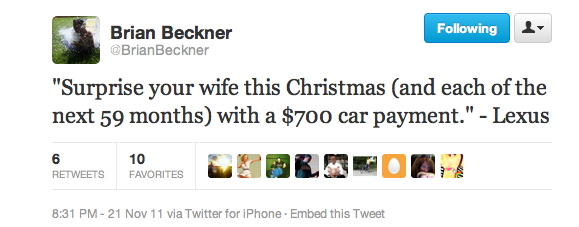Damn those Alpha Centaurians for colonizing the 3rd planet from the sun instead of the 2nd. We could all be lounging around in our shorts right now, instead of just the lucky folks near the Equator.
Yes, it’s still fall. Hasn’t stopped some of you from complaining about winter, however. Someone on Twitter recently said something like “you can tell if someone’s rich if they look forward to winter.” Maybe that’s an old sentiment, but we’d never heard it before. Also, Trent Hamm is an idiot.
Okay, on with the Carnival…personal finance blog posts brought to you from around the universe. We remove all the bad ones (well, some of the bad ones) and leave the rest for your reading pleasure. If you want to submit, click here. Read the directions. Use common sense. Don’t submit twice for the same edition. Check your spelling. Eat your vegetables. Tote that bale. Lift that barge. Now read:
We welcome Off Road Finance to the party this week, a frank and literate addition that will probably scare the casual reader off. (Nothing wrong with that, by the way.) The mysteriously yclept “W” apparently earns income as a voracious stock trader, but cautions that it’s not for everyone.
Our favorite post title of the week is “Work Hard And Shut Up” from Your Finances Simplified, who met the world’s fastest busboy at the neighborhood IHOP. The link contains video which we assumed we were watching at double speed. We weren’t.
Boomer (and her crime-fighting sidekick, Echo) return with a post about ADRs. American Depository Receipts are shares of non-U.S. companies that Americans can buy. Well, that’s an extremely coarse simplification. B&E explain them in considerably more detail.
101 Centavos offers one of his patented coffee break posts this week, which are (in his own words) “interlude(s) between more satisfying and better-researched articles.” This one about knowing when to walk away from the negotiating table was plenty satisfying to us.
Hank at Money Q&A thinks you should get a 529 savings plan or a Roth IRA for your kids this Christmas.
Our 2nd-favorite post title of the week is from Daniel at Sweating the Big Stuff, and contains the sort of mild expletive that would make your grandmother blush. Daniel writes about something one of our Twitter followees mentioned last month:
Or as Daniel puts it, “Surprise, I just locked you into a $30,000 contract and you’re going to be paying someone else every single month for the next 5 years!”
Which is as good a time as any to editorialize. We’ve written before about how wasteful Christmas gifts are, but they’re doubly worse when your gift turns out to be an obligation.
6 years ago, one of the Control Your Cash principals bought the other a vehicular satellite radio receiver for Christmas. A modest, $100-or-so gift. HOWEVER…
This particular receiver wasn’t compatible with the truck in question. Which required a trade-in (of the receiver, not the truck). The compatible receiver was an extra $80. The instructions for installing the receiver included the phrase ‘using a rotary hammer drill with a ⅞” bit, drill a hole in the roof of the vehicle allowing sufficient slack for the wires to…’ You know what? Maybe this job requires a professional. Whom we found at Tweeter, a high-end electronics retailer that was a few days from extinction. So when the receiver started acting up a week later we had to go to another car audio specialty store, which, of course, charged us to start the job again from scratch.
And the original gift only included the receiver, not a subscription. Long story short, this show of holiday generosity ended up costing the recipient about $900. Gifts are stupid. There, now you’ve enjoyed a rare glimpse into our glamorous personal lives.
He worked hard on this, so we’ll indulge him. The blindingly Caucasian Kevin at Thousandaire took the theme song from The Fresh Prince of Bel-Air and wrote lyrics about how to save money on your cable bill. He also rhymed “wondering” with “300”.
Our weekly English as a Second Language post comes from a new submitter, Eddie at Finance Fox. Eddie writes about the phenomenon of people returning to their previous employers, which apparently is a thing. Here are some excerpts:
Other ex-employee simply because they are unwilling to suck up their pride.
That’s supposed to stand alone as a sentence. We think.
…one has to look for them selves first.
Eddie also lists the reasons people quit their jobs. Did you know people quit because they can make more money elsewhere? Or because they don’t like their existing bosses? Or for personal reasons? They do, and Eddie has helpfully brought those reasons to our attention.
He concludes with the always worthwhile advice,
Ultimately, you have to make the decision that’s best for you.
It’s that kind of insight and wisdom that we encourage here in the Carnival of Wealth.
There are people whose tax strategy consists of taking their pay stubs to Jackson Hewitt, and then there are people like Phil at PT Money. Phil is deferring, prepaying, incorporating, donating, and staying one step ahead of the IRS before 2011 ends. What are you doing?
The magnificent DQYDJ (Don’t Quit Your Day Job) wrote a post that breaks down the net worths of the congressmen and senators who spend your money. Did you know that 30 of them are in the red? They include Alcee Hastings (D-FL), whom you might know as one of 6 federal judges in U.S. history to be impeached, and Keith Ellison (D-MN), who should get a second job but instead is hunger striking with some Occupy protesters this week. Is it Ramadan already? Actually, Ellison looks like he could afford to miss a couple of meals.
DQYDJ’s handiwork includes what seems to be a cool chart, but we couldn’t get the plug-in to work in Chrome and were too lazy to try it in Safari. But still not as lazy as the bloggers whose idea of hosting a carnival is to cut and paste everyone’s submissions into a Word document and then upload it.
(UPDATE: Just updated Chrome. It works fine now.)
Jon of Free Money Wisdom makes a cameo on Christian PF this week, writing about the labyrinthine mess you could end up in if you inherit someone else’s 401(k).
Proper form, or interesting content: choose one.
That might as well be the Carnival of Wealth motto. Paul at The Frugal Toad grabs you by the lapels and doesn’t let go in this thrilling roller-coaster romp of a ride called “Estate Planning Basics: What You Need To Know”. We’ll try to keep our critique shorter than his 300-word post, a sneak preview clip of which reads as follows:
Estate planning can be complex at times so it is advisable to seek advise from a competent lawyer specializing in Estate Planning. Some items you will want legal assistance with are:
- Prepare a will so that your assets transfer to your loved ones
- Check to make sure your accounts are titled properly
- Have a durable power of attorney so someone can make financial decisions in case you are unable to
- Draft a living will/health care directive to remove the burden of difficult end of life decisions from family members
“Check to make sure”, not to be confused with its twin sibling, “make sure to check.” Have you caught your breath yet? We remain amazed at how many functioning adults majored in ponderous composition in college.
Next up, some chick sent along a post titled “The Biggest Myths About Marriage.” (“Never go to bed angry”, etc.) Somewhere out there must be a corresponding post titled “The Biggest Myths About Control Your Cash“, which first lists “We give a crap about people’s marriage advice.”
Baptême! Ciboire! Calisse de tabernac!
Those are all the French swear words we know, but we’d like to learn some more so we can properly review this properly composed yet obscenely misleading post from Shaun at Smart Family Finance. Shaun’s first paragraph starts off rockily, and then it gets worse:
If you want to be rich, you ought to consider getting a graduate degree… carrying a higher level of education is a common characteristic among the wealthiest 1% of Americans.
THE ABSOLUTE LAST THING YOU SHOULD DO IS GET, OR IN SHAUN’S TIMID PHRASING, CONSIDER GETTING, A GRADUATE DEGREE.
Look at those cretins clogging up Zucotti Park and related venues across the continent. Their primary lament, aside from capitalism being evil, is that they’re overeducated and underemployed. Shaun quotes statistics that reinforce his belief that a master’s or doctorate helps you earn more money. But he doesn’t say one g.d. word about fields of study. Some indebted idiot is going to read Shaun’s post, decide to waste 2 more years earning an M.A. in philosophy, then fall even further behind.
A master’s in electrical engineering? Hell yes, go for it. A master’s in the arts or the soft sciences is about as useful as a left-handed skyhook or a key to the batter’s box. But on the surface, getting an advanced degree sounds good, and therefore can be the subject of anyone’s unimaginative blog post.
Sure, finishing elementary school is better than quitting after kindergarten. And getting a high school diploma is better than being an 11-year old dropout. But there is such a thing as diminishing returns (or functions with a negative second derivative, for those of you who never took any math classes in college.) Shaun is a CPA with a business degree and should know better.
Christmas is next week. The only things we want to see in our stockings are insightful, well-written blog posts. Is that too much to ask? Maybe Santa Claus isn’t real after all.





